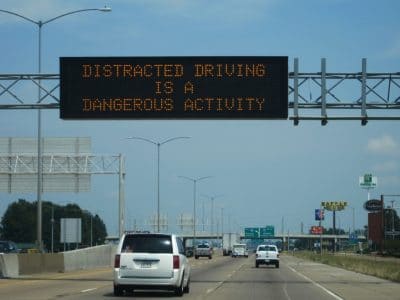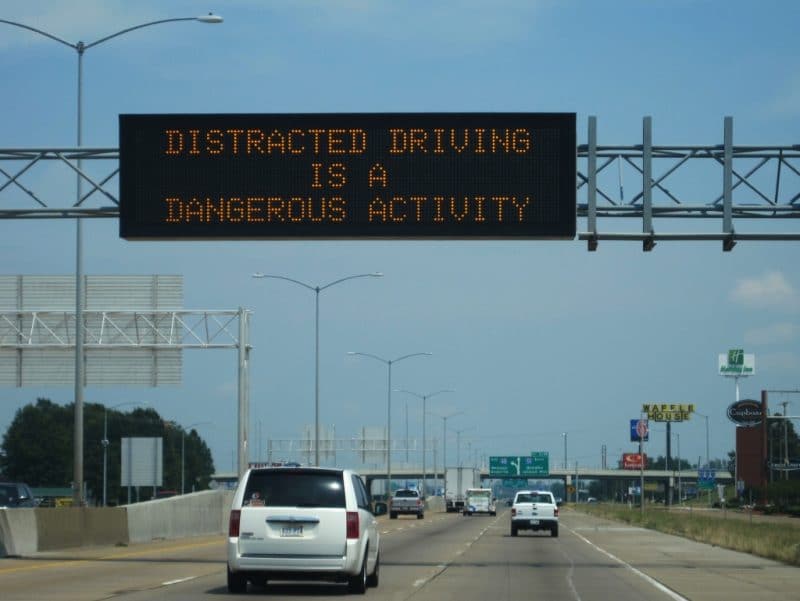
There are hundreds of ways to be distracted (and ultimately cause accidents) on the roadways these days. Everything from the passing billboards to the adjacent cars next to you can cause a distraction on behalf of the driver. One of the more talked about distractions on the road these days includes the use of cell phones.
Some states, such as California, have banned the use of cell phones requiring physical touch (hands-free equipment is acceptable), while other states have no such law. Texting as well is slowly becoming a prevalent problem in our society as drivers use their senses on sending a quick message than on the road in front of them.
The question subsequently becomes, why? Why are cell phones so difficult to put down when we are driving? Is the distraction directly linked to the physical form of talking on a cell phone, or on a larger level, such as the steering of thoughts away from the road and into the conversation on the phone?
In the grand picture do most drivers adequately understand the risks of driving and using a cell phone? The answers to each of these questions are complex and not one hundred percent clear, however; there are a few answers that might provide some depth to the inquiry.
The findings ultimately point to a General Consensus, or an overview of cell phone usage in the car.
Table of Contents
Why are cell phones so difficult to put down when we are driving?
Many times using a cell phone in the car involves some aspect of social communication and niche. The use of a cell phone does not only have to involve the driver but can also involve the passenger, who surprisingly enough can equally contribute to distracted driving.
A report on the effects of an incoming call on both the driver and the passenger was investigated in a scholarly report recently published titled, “Technologies, Multitasking, and Driving: Attending to and Preparing for a Mobile Phone Conversation in a Car.” The article highlights and plays on many ideas that delve into the psyche of drivers who use cell phones. Interestingly enough, many drivers and passengers still choose to answer their phones even though most of their senses are already occupied. The reason for this probably involves the social pressure that is applied either consciously or subconsciously to taking a phone call. Many users feel that if they do not answer the call, the person on the other side of the call will not see driving as an acceptable action towards declining the call. Subsequently, since our technological age has created instant information access through multiple means, including cell phones, many people’s emotions are elevated when information or the caller in this case is not readily accessible.
Additionally, the lives of most American’s are busy and full of different forces. A Yahoo! article cited American’s were so busy, they didn’t even have time to eat a bowl of cereal in the morning before they head off to work. This paired with the incessant idea of multitasking in the car to save some time ultimately creates a lot of distracted driving. Our society has created these ideas that driving a car and talking or texting on the phone, many times faster than forty miles per hour, is a safe expedition and does not stretch our senses too far.
The idea that whatever is on the other side of this virtual veil is worth risking our lives, and possibly the other lives of others, such as this video released by the National Safety Council. These societal pressures all contribute to the reasons we fail to put down our phones.
Is the distraction directly linked to the physical form of talking on a cell phone, or on a larger level, such as the steering of thoughts away from the road and into the conversation on the phone?
The State of the Nation of cell phone distracted driving has called for a complete ban of all cell phones on the road. Their address, published within the last year, cited their research showed 24% of all crashes, injurious or not, involved some type of cell phone usage. The question is always whether these facts stem from the talking on the phone, or the conversation the driver is participating in. California, as stated before, seems to think it is less about the conversation and more about the driver holding the phone or trying to interface with the screen while driving that is the problem.
A post from the Insurance Institute for Highway Safety stated that almost five percent of drivers used handheld phones in their daily routines. Through the rise of the smartphone generation, the number of drivers using handheld devices has almost tripled.
On the other side of the spectrum, many believe conversations are the real problem when it comes to cell phones. A study from Harvard University shows that even with hands-free devices many individuals are just as distracted with their conversations. Moreover, drivers who are talking on the phone tend to drift between lanes more often than when they talk to passengers within their cars. The study even goes as far as to say that against the physical aspect of talking on the phone, talking, in general, is essentially the same as drunk driving.
This debate will probably continue on in the future. If the physical use of cell phones is the problem, then states such as aforementioned California have implemented a law that is useful and overall keeps people safer. If however, it is more about the mere fact of talking while driving; then these laws are essentially worthless because they aren’t truly protecting people against the risk of cell phones.
In the grand picture do most drivers adequately understand the risks of driving and using a cell phone?
The answer for most people probably is no; they do not adequately understand the risk of
driving with their cell phone.
Legally more and more individuals are coming under fire for using their cell phones on the road, especially concerning texting. A couple who was in a motorcycle accident from a man who was texting while driving is not only suing him for the damages and injury they experienced but also his girlfriend who was on the other side of the text message. While this has its own legal battle, the fact of negligence when people use their cell phones and choose to drive is not lightly taken. Other accidents that involve distracted cell phone driving can affect insurance liabilities amongst lawsuits if there were injuries to other people or extensive damage to cars.
Injuries, as well as fatalities, are also a major part of cell phone consequences. Fatalities, no matter the education that is released, still persist on our roadways; even when states are dutifully battling the issue. The responsibility of being distracted is always higher than the driver seems to admit.
A campaign by the NY Times helps to educate people on the actual level of distraction they experience when they are driving might surprise you in how distracted you actually are. The question ultimately asks if the driver understands and remembers the full and potential consequences that can occur when they use their cell phone. Do they think about their loved ones and wonder what it would be like to lose them to an out-of-control distracted cell phone driver? Do they think of the potentially serious injury that could occur? Sadly enough, many don’t think about these ideas, and what’s more, those who do think about these risks decide that situations and consequences as such would never occur to them. They then assume the risk and drive using their cell phone.
The General Consensus:
The general consensus it seems, that links all these issues together is safety paired against the distraction cell phones ensue. If you do choose to use your cell phone in the car you must be prepared for the possibility of a car accident. You must be prepared to potentially take responsibility for the accident and the injuries that can occur. Being aware of the risk you are taking is good, but in the good/better/best spectrum of cell phones and driving, the “best” will always be assuming the utmost responsibility is NOT talking and driving.
If you have been on the other side of an incident in where the responsibility of another party has been utilized, concerning cell phones, and you have been injured, or simply have been tossed into a stressful situation; there are ways to peacefully resolve the dispute. We, at Good Guys Injury Law, look to ease these situations and help you traverse the confusing roads of cell phone accidents. Always confidential, we look to protect those who have been affected from somebody else’s lack of responsibility on the road with their cell phones.
While the social lines we live in may not be clearly pointing to being safe on the road, logic and those educated plead with motorists everywhere to put the cell phone’s down. Point in fact: cell phone usage while driving will ALWAYS make you a distracted driver.
